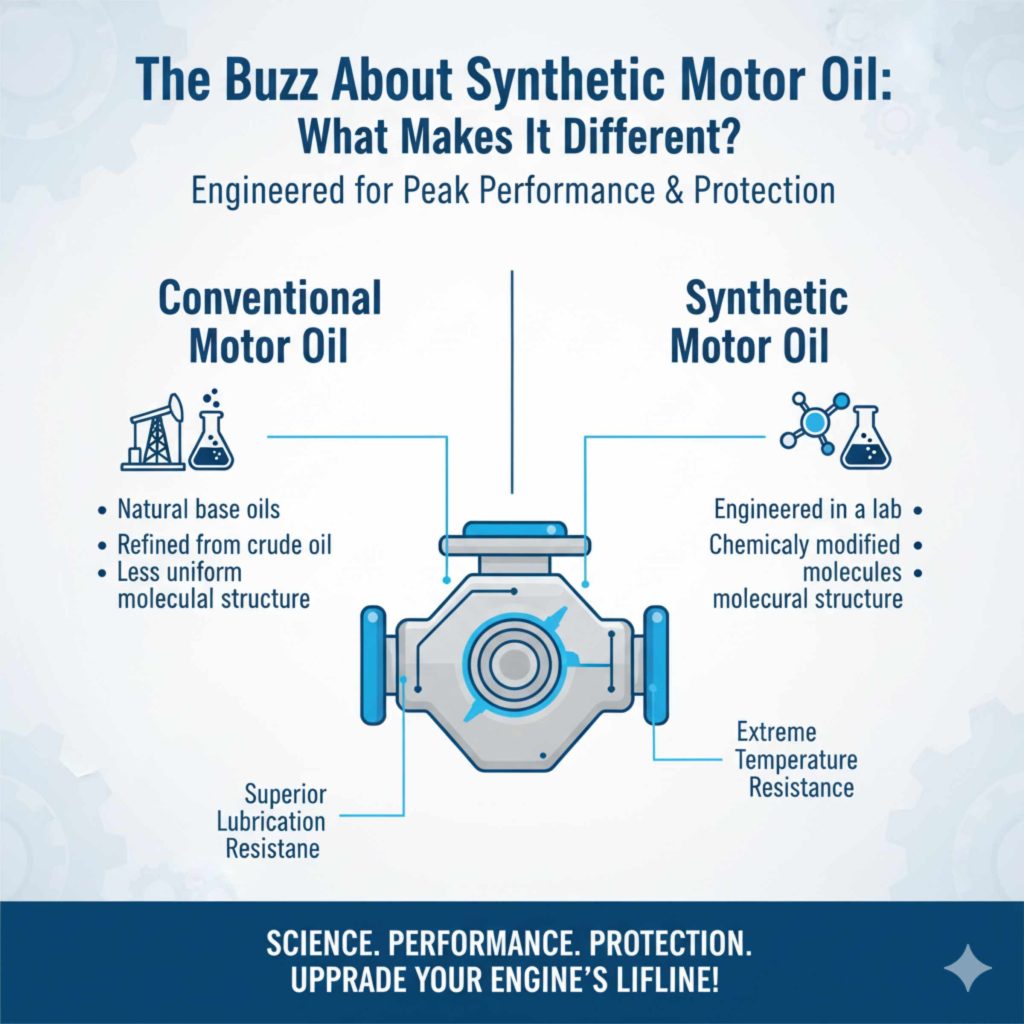Quick Summary:
Synthetic motor oil offers superior engine protection, better performance in extreme temperatures, and longer drain intervals compared to conventional oil. It’s engineered for durability, leading to a healthier engine and potentially saving you money on maintenance over time.
Ever wondered if that pricier motor oil is really worth it for your car? You’re not alone! Many drivers see different types of oil on store shelves and wonder, “What’s the big deal?” Choosing the right motor oil is super important for your engine’s health and how long it lasts. Some oils promise better protection and performance, but what does that actually mean for you and your car? If you’ve ever felt a bit lost in the automotive aisle, today’s guide is for you. We’re going to break down the benefits of synthetic motor oil in simple terms. You’ll learn exactly why it’s a smart choice for your vehicle and how it stacks up against traditional oil, so you can make confident decisions about your car’s care. Let’s get your engine running its best!
The Buzz About Synthetic Motor Oil: What Makes It Different?
So, what exactly is synthetic motor oil, and why does it get so much attention? Think of it like this: conventional motor oil is like the oil found naturally, refined to be usable in your car. Synthetic motor oil, on the other hand, is meticulously engineered in a lab. Scientists start with basic oil molecules and chemically modify them to create oil with specific, high-performance properties. This precise creation process means synthetic oils have a more uniform molecular structure, which leads to a host of advantages. They’re designed to withstand tougher conditions and offer a higher level of protection than their conventional counterparts. This makes them a standout choice for modern engines and drivers who want the best for their ride.

What Are The Benefits Of Synthetic Motor Oil Compared To Conventional?
When we talk about synthetic motor oil benefits, we’re essentially looking at how it compares to the traditional, conventional oil that many cars have used for decades. While conventional oil does a decent job, synthetic oil takes engine lubrication and protection to a whole new level. Here’s a breakdown of the key advantages:
1. Superior Engine Protection
One of the biggest wins for synthetic oil is its ability to protect your engine, especially under demanding conditions. Because its molecules are uniform and engineered, synthetic oil provides a more consistent and robust lubricating film. This film acts as a barrier between moving parts, reducing friction and wear. Imagine your engine’s parts moving at thousands of rotations per minute – synthetic oil keeps them gliding smoothly, preventing metal-on-metal contact that can cause damage over time.
This enhanced protection is crucial for several reasons:
- Reduced Wear: The smoother, stronger film minimizes the scraping and grinding that can wear down engine components like pistons, bearings, and camshafts.
- Cleaner Engine: Synthetic oils often contain advanced additive packages that help prevent sludge and deposit formation. Sludge is like gunk that can clog oil passages and starve parts of oil, leading to overheating and failure. Synthetic oils keep these contaminants suspended so they can be drained out during an oil change.
- Better for High-Performance Engines: If you have a turbocharged, supercharged, or high-revving engine, it generates more heat and stress. Synthetic oil is built to handle this added demand, offering superior protection where conventional oil might break down.
2. Enhanced Performance in Extreme Temperatures
Your car lives in the real world, which means dealing with everything from freezing winters to scorching summers. Synthetic motor oil excels in these temperature extremes, offering benefits that conventional oil struggles to match.
In Cold Weather:
When it’s cold, especially during start-up, conventional oil can thicken and become sluggish. This means it takes longer for the oil to reach all the critical engine parts that need lubrication. Synthetic oil is formulated to remain more fluid at low temperatures. This “cold flow” property allows it to circulate quickly from the moment you turn the key, providing instant lubrication and reducing the wear that happens most during those critical first few minutes of operation.
In Hot Weather:
Engines generate a lot of heat, and high temperatures can cause conventional oil to thin out and degrade, losing its lubricating ability. Synthetic oils are designed to resist thermal breakdown. They maintain their viscosity (thickness) better at high operating temperatures, ensuring your engine stays protected even when working hard on a hot day or during heavy loads like towing.
3. Longer Oil Drain Intervals
One of the most attractive practical benefits of synthetic oil is that it generally lasts longer than conventional oil. This means you can drive more miles between oil changes. This isn’t just about convenience; it can also lead to cost savings over time.
Manufacturers often recommend longer oil change intervals for vehicles using synthetic oil. While a typical conventional oil change might be needed every 3,000 to 5,000 miles, synthetic oil can often go 7,500 to 10,000 miles, and sometimes even more, depending on the specific oil and your car’s requirements. Always check your owner’s manual for the manufacturer’s recommendation!
Why does it last longer?
- Resistance to Oxidation: Synthetic oils break down less when exposed to oxygen and heat, which is the main culprit behind oil degradation.
- Maintains Properties: They hold onto their beneficial properties, like viscosity and protective additives, for a much longer period.
This means fewer trips to the mechanic for oil changes, less disposal of used oil, and a potentially lower overall maintenance cost for your vehicle.
4. Improved Fuel Economy
Friction within an engine wastes energy. The more work your engine has to do to overcome internal friction, the more fuel it burns. Since synthetic oil is engineered to reduce friction more effectively than conventional oil, it can contribute to better fuel economy.
By providing a more slippery and consistent lubricating film, synthetic oil allows engine components to move more freely. This means less energy is lost due to friction, and more of the power generated by combustion is used to actually move your car. While the percentage increase in fuel economy can vary depending on your driving habits and vehicle, many drivers notice a slight improvement. This can add up to noticeable savings at the gas pump over time.
5. Reduced Oil Consumption
Oil can slowly burn off or leak in an engine over time. This is known as oil consumption. Synthetic oils, with their stable molecular structure, are less volatile and less prone to evaporation, especially at high temperatures. This means less oil burns away in the combustion chamber.
For older engines that might consume a bit more oil, or for any engine that tends to go through oil between changes, a high-quality synthetic oil can help reduce how much oil you need to top up. This can save you money on purchasing extra oil and contribute to a cleaner exhaust system since less oil is being burned.
Synthetic vs. Conventional Motor Oil: A Quick Comparison
To really see the difference, it helps to put them side-by-side. Here’s a look at how synthetic and conventional motor oils generally stack up:
| Feature | Synthetic Motor Oil | Conventional Motor Oil |
|---|---|---|
| Base Oil | Chemically engineered and refined molecules | Refined crude oil |
| Molecular Structure | Uniform, precise | Variable, less consistent |
| Protection Against Wear | Superior, robust | Good, but less effective under stress |
| Temperature Performance | Excellent (cold and hot) | Fair to good; can thicken in cold, degrade in heat |
| Resistance to Break Down | High | Moderate |
| Sludge & Deposit Control | Excellent | Fair to good |
| Fuel Economy Impact | Slight improvement | Standard |
| Oil Drain Interval | Longer (e.g., 7,500-10,000+ miles) | Shorter (e.g., 3,000-5,000 miles) |
| Cost | Higher upfront cost | Lower upfront cost |
As you can see, synthetic oil generally offers a higher tier of performance and protection across the board. While the initial cost is higher, the benefits in terms of engine longevity, performance, and potentially reduced maintenance can make it a valuable investment.
When Is It Especially Worth Considering Synthetic Oil?
While synthetic oil is a great choice for most vehicles today, there are certain situations where its benefits are even more pronounced:
- Modern, High-Performance Engines: Many newer cars, especially those with turbochargers, direct injection, or complex emissions systems, are designed with synthetic oil use in mind. Consult your owner’s manual!
- Extreme Driving Conditions: If you frequently drive in stop-and-go traffic, extreme temperatures, tow heavy loads, or race your vehicle, synthetic oil offers enhanced protection.
- Longer Oil Change Intervals: You value the convenience of fewer oil changes and are willing to pay a bit more upfront for that benefit.
- Maximizing Engine Lifespan: For those who plan to keep their vehicle for many years, the superior protection synthetic oil offers can contribute significantly to long-term engine health.
Understanding Oil Viscosity and Weight
You might have seen numbers like “5W-30” or “10W-40” on oil bottles. This is called viscosity, and it tells you how thick or thin the oil is. Understanding this is key to picking the right oil for your car. The number before the ‘W’ (which stands for Winter) indicates how well the oil flows at cold temperatures. A lower number means it flows better in the cold. The second number indicates how well it flows at operating temperature (hot). A higher number means it’s thicker.
Synthetic oils offer better viscosity control across a wider temperature range compared to conventional oils. For example, a synthetic 5W-30 will likely flow much better than a conventional 5W-30 in freezing temperatures while still providing adequate protection at engine operating heat. This is a significant advantage for consistent lubrication.
The U.S. Department of Energy highlights that using the recommended viscosity grade for your vehicle is crucial for both performance and fuel efficiency. Always refer to your vehicle’s owner’s manual for the specific viscosity grade recommended by the manufacturer.
The Role of Additives in Synthetic Oil
It’s not just the base oil that makes synthetics superior; it’s also the advanced additive packages that are blended into them. These additives are like special ingredients that give the oil its unique capabilities.
Common additives include:
- Detergents: Keep engine parts clean by preventing deposits.
- Dispersants: Keep contaminants suspended in the oil so they can be drained out, preventing sludge.
- Anti-wear agents: Form a protective layer on metal surfaces to reduce friction and wear.
- Oxidation inhibitors: Slow down the oil’s degradation process due to heat and air.
- Viscosity index improvers: Help the oil maintain its thickness across a wider temperature range.
Synthetic base oils are a better “carrier” for these additives, meaning they can be blended more effectively and perform their jobs more efficiently than in conventional oils. This synergistic effect contributes greatly to the overall superior performance of synthetic motor oil.
Are There Any Downsides to Synthetic Oil?
While the benefits of synthetic oil are substantial, it’s fair to consider any potential drawbacks. The primary one is the upfront cost. Synthetic oil typically costs more per quart than conventional oil. If you drive a very old car that has always used conventional oil and you only plan to keep it for a short time, the cost difference might seem hard to justify, especially if your car’s manufacturer recommends conventional oil.
Another consideration, though less common with modern synthetics, is the idea that switching from conventional to full synthetic in a very high-mileage engine could potentially cause seals to leak. This is because conventional oils sometimes contain solvents that can swell older seals, and switching to a “solvent-free” synthetic might cause those seals to shrink. However, most modern full synthetic oils are designed to be compatible with older seals, and many manufacturers even offer synthetics specifically for high-mileage vehicles that address these concerns. If you have an older engine, it’s always a good idea to check with your mechanic or the oil manufacturer about compatibility.
Making the Switch: What to Know
If your car owner’s manual recommends synthetic oil, making the switch is a no-brainer and highly beneficial. If your car can use either conventional or synthetic oil, here’s what’s good to know:
- Check Your Owner’s Manual: This is the most important step. It will tell you the recommended oil type, viscosity, and any specific certifications your engine needs.
- Compatibility: Most modern synthetic oils are compatible with conventional oils. If you need to top up your oil between changes and don’t have the exact type, you can often mix conventional and synthetic in a pinch. However, for a full oil change, using the same type of oil (either all conventional or all synthetic) is best for optimal performance.
- High-Mileage Synthetics: If you have a car with 75,000 miles or more, consider a synthetic oil specifically formulated for high-mileage engines. These often contain extra conditioners to help reseal aging gaskets and reduce leaks.
- Not All Synthetics Are Equal: There are full synthetics and synthetic blends. A blend uses a mix of conventional and synthetic base oils, offering some of the benefits of synthetics at a lower price point than full synthetic. Full synthetic offers the most benefits.

Frequently Asked Questions (FAQ)
Q1: Is synthetic oil really better than conventional oil for my car?
A: Yes, generally synthetic oil offers superior protection, performs better in extreme temperatures, lasts longer, and can improve fuel economy compared to conventional oil. It’s engineered for optimal engine health and longevity.
Q2: Can I switch to synthetic oil if my car has always used conventional oil?
A: In most cases, yes! For newer vehicles or those with standard mileage operations, switching is generally safe and beneficial. Just ensure you choose the correct viscosity and meet any manufacturer specifications listed in your owner’s manual. For very high-mileage or older engines, it’s wise to consider a high-mileage synthetic blend or consult your mechanic.
Q3: How often should I change synthetic oil?
A: Synthetic oil typically allows for longer oil change intervals than conventional oil. Many manufacturers recommend changing synthetic oil every 7,500 to 10,000 miles, or even more, depending on the specific oil and your driving conditions. Always consult your owner’s manual for the exact recommendation.
Q4: Is synthetic oil more expensive?
A: Yes, synthetic oil generally has a higher upfront cost per quart than conventional oil. However, the longer drain intervals and potential for improved fuel economy and reduced wear can often offset the initial cost over the life of the vehicle.
Q5: What does “5W-30” mean on an oil bottle?
A: This refers to the oil’s viscosity, or thickness. The “5W” means it flows well in cold (Winter) conditions, and the “30” indicates its thickness at normal engine operating temperatures. Synthetic oils maintain their specified viscosity more effectively across a wider temperature range than conventional oils.
Q6: Do I need to use a specific brand of synthetic oil?
A: While brands have their own formulations and additive packages, the most important thing is to choose a synthetic oil that meets the specifications (viscosity grade and API service category) recommended in your owner’s manual. Reputable brands offer products that meet these standards.
Q7: Can I mix synthetic oil with conventional oil?
A: Most modern synthetic and conventional oils are compatible, meaning you can mix them in a pinch if you need to top up your oil between changes. However, for a full oil change, it’s best to stick with one type to get the full benefits of synthetic oil.
Conclusion: Investing in Your Engine’s Future
Choosing the right motor oil is a crucial aspect of car maintenance that directly impacts your vehicle’s performance and lifespan. While synthetic motor oil comes with a higher initial price tag, the benefits it offers are substantial and often outweigh the cost over time. From superior protection against wear and tear, to reliable performance in scorching heat or freezing cold, and the convenience of longer drain intervals, synthetic oil is engineered to help your engine run smoother, cleaner, and longer.

